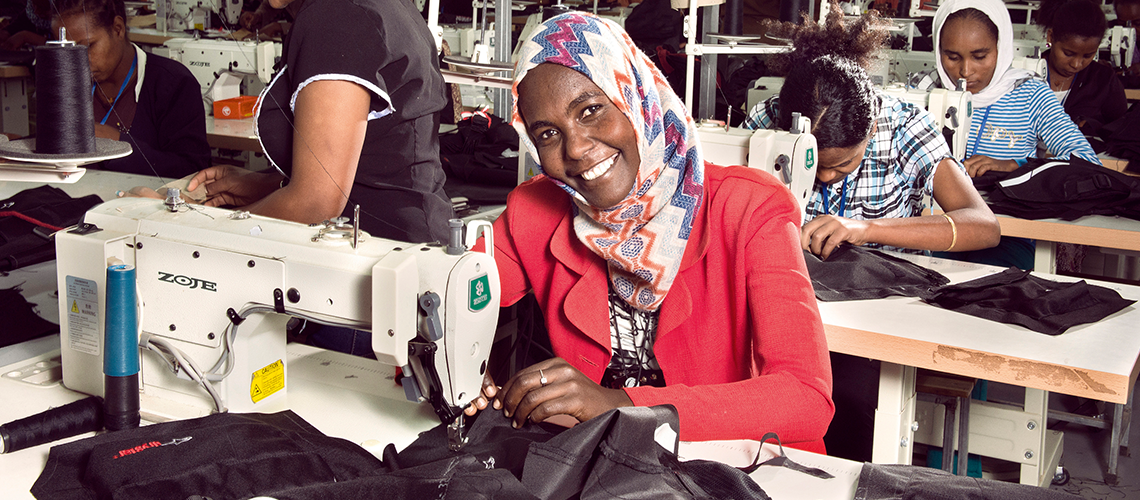 Nebiba Mohammed, 28, works at the Shints textile factory, one of several textile manufacturing plants in Ethiopia's recently opened Bole Lemi industrial park
Nebiba Mohammed, 28, works at the Shints textile factory, one of several textile manufacturing plants in Ethiopia's recently opened Bole Lemi industrial park
Within the next six months, 55 countries across Africa are set to establish one of the largest free trade areas in the world: the African Continental Free Trade Area (AfCFTA). The continent is emerging as a surprising leader in advancing rules-based trade—and its success is highlighting how developing countries could play a key role in shaping a 21st century trade agenda.
Throughout much of the 20th century, Africa lagged behind other regions in global integration. Its tariffs remained high and trading patterns have—for many countries—remained unchanged from the colonial era. But things have shifted recently. A variety of countries in Africa at all levels of development—such as Morocco, Ethiopia, and Mauritius—have begun integrating into global value chains, accompanied by foreign direct investment and rising productivity.
AfCFTA has the potential to extend these gains across the continent. By 2035, the agreement could increase real income by 7 percent—or nearly $450 billion, according to new research by the World Bank. The volume of total exports would increase by almost 29 percent relative to business as usual. Intracontinental exports would increase by more than 81 percent, while exports to non-African countries would rise by 19 percent. This will create new opportunities for African manufacturers and workers.
"The continent is emerging as a surprising leader in advancing rules-based trade—and its success is highlighting how developing countries could play a key role in shaping a 21st century trade agenda."
These gains would flow largely to the most vulnerable citizens. Successful implementation of AfCFTA would lift an estimated 30 million Africans out of extreme poverty and boost the incomes of nearly 68 million others who live on less than $5.50 a day. Wages would rise, with women seeing increases of 10.5 percent and men by 9.9 percent by 2035. It would also boost wages for skilled and unskilled workers alike—10.3 percent for unskilled workers, and 9.8 percent for skilled workers.
These gains largely reflect AfCFTA’s emphasis on lowering trade costs. Decreasing tariffs, reducing nontariff barriers, and improving hard and soft infrastructure at the borders will reduce red tape, lower compliance costs for traders, thereby boosting intracontinental trade and ultimately make it easier for African businesses to integrate into global supply chains.
But getting there will not be easy. Many countries will face substantial political pressure to protect uncompetitive domestic industries that stand to lose from foreign competition. Our research shows that policymakers that are able to resist short-term political fixes stand to gain the most through increased productivity gains. While the overall net effects will be positive, AfCFTA’s implementation will result in job losses in sectors where countries are less competitive—and governments will need to be ready to support workers with adequate safety nets and policies to retrain them.
COVID-19 has intensified the need for speedy implementation. Because of the pandemic, Africa is expected to suffer its first outright recession in 25 years as output shrinks by as much as 5.1 percent this year. That implies as much as $79 billion in output losses. The pandemic has also highlighted deficiencies in border management procedures, with long lines of trucks at some border crossings that can drive up prices and cause scarcity in essential goods.
In this context, a successful implementation of AfCFTA could help mitigate the economic crisis and set the continent on a path for renewed growth. In the short term, it would cushion COVID-19 effects on economic growth by reducing trade costs and boosting regional trade and value. In the longer term, it would provide a path for integration and growth-enhancing reforms for African countries. By replacing a patchwork of regional agreements, streamlining border procedures, and prioritizing trade reforms, AfCFTA could help African countries increase their resiliency in the face of future economic shocks.
Much work remains to be done. But Africa’s actions so far show that it is up to the task, and AfCFTA is laying the foundation for it to reap the benefits of integration into the global economy.



Join the Conversation